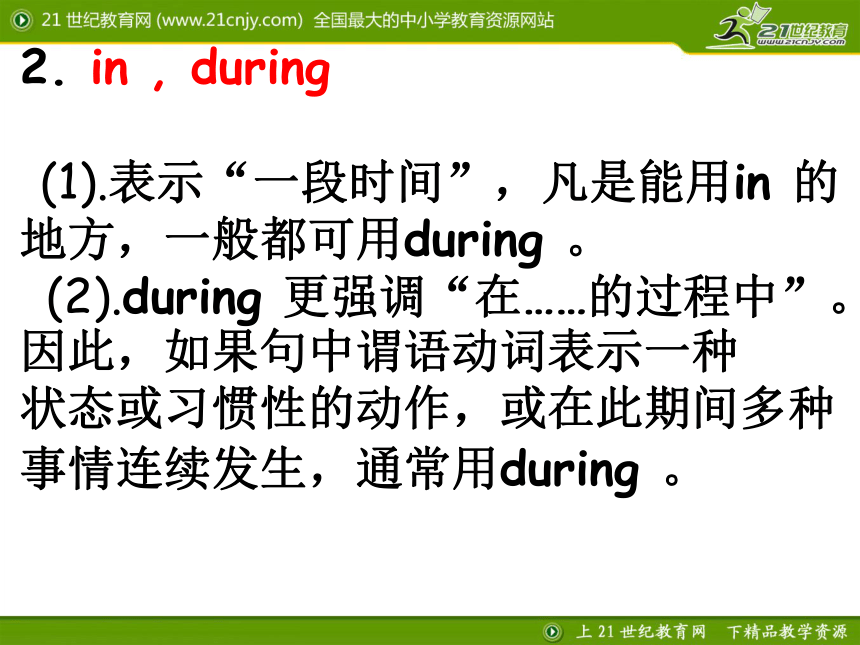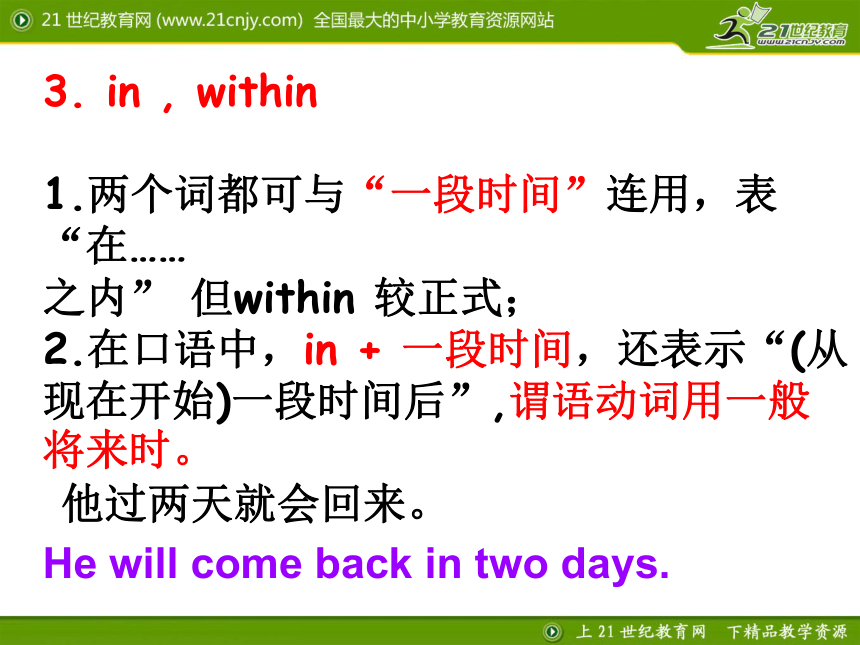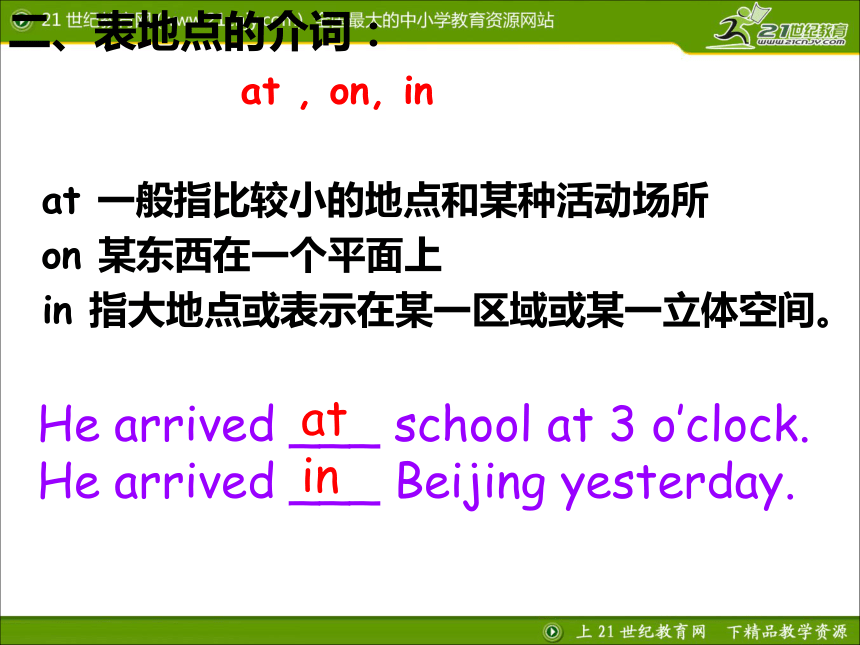陕西省某二中2013届高三英语二轮复习精品课件:介词(3)
文档属性
| 名称 | 陕西省某二中2013届高三英语二轮复习精品课件:介词(3) |  | |
| 格式 | zip | ||
| 文件大小 | 104.1KB | ||
| 资源类型 | 教案 | ||
| 版本资源 | |||
| 科目 | 英语 | ||
| 更新时间 | 2012-06-22 14:21:09 | ||
图片预览









文档简介
(共23张PPT)
介 词
常见介词的意义和用法
介词和其他词类的搭配
其他注意点
常见介词的意义和用法
___ the morning of June 27, the
Team reached the top of the mountain.
A. by B. At C. in D. On
一、表示时间的介词:
1. at, on, in
at 6 o’clock/that time/noon/night/dawn黎明/ weekend, etc.
on Monday (morning)/July 1,1921/Christmas Day, /a fine morning , etc.
in the morning/ July/spring/2005/the 21st century, etc.
We need to pay this electricity bill ____ January 31st.
A. In B. by C. during D. within
2. in , during
(1).表示“一段时间”,凡是能用in 的地方,一般都可用during 。
(2).during 更强调“在……的过程中”。
因此,如果句中谓语动词表示一种
状态或习惯性的动作,或在此期间多种
事情连续发生,通常用during 。
在20世纪90年代,美国的乡村音乐变得越来越流行。
During the 1990s,American country music has become more and more popular.
3. in , within
1.两个词都可与“一段时间”连用,表“在……
之内” 但within 较正式;
2.在口语中,in + 一段时间,还表示“(从
现在开始)一段时间后”,谓语动词用一般将来时。
他过两天就会回来。
He will come back in two days.
4. in , after , since
in + 一段时间“(从现在开始)一段时间后”、“过……”,谓语动词用一般将来时;
after + 一段时间 “(从过去某时开始)一段时间后”,谓语动词用一般过去时;
He finished the work ____ 3 days.
He will finish the work ____ 3 days.
/
after
in
after + 时间点“在某时之后”,谓语动词可根据句子要求用各种时态;
他经常在6点之后去散步。
He often go for a walk after 6 o’clock.
Since“自从”,表示从过去某一时间开始一直延续到说话时间止,谓语动词一般用现在或过去完成时。
我10岁就开始学习英语了。
I have learned English since I was ten.
二、表地点的介词:
at , on, in
at 一般指比较小的地点和某种活动场所
on 某东西在一个平面上
in 指大地点或表示在某一区域或某一立体空间。
He arrived ___ school at 3 o’clock.
He arrived ___ Beijing yesterday.
at
in
三、表示方位的介词:
1.in , on ,
in 表“在内” ,
to 强调方位,常在外部,
on 表“相连” 。
e.g. London is in the southeast of England .
U.S. is to the west of China .
Mexico is on the south of U.S.
to
Japan is an island country that lies ___ the
east of China.
A. to B in C on D above
2. over , above ,on在……上方
over是“正上方”,
above只表示“在上方”但不一定在“正上方”,
on除可表示“在……上面”,还可表示“在水边或
在左/右边”
on the right 在右边
on the river 在河边
Our plane flew _____ the clouds.
There is a light _____ Li Ming.
above
over
3. under , below 在……下方
under:在……下面(正下方,over的反义词);
在……之内
under the table
桌子下面
under the jacket
在夹克内
The dog is under the table.
这只狗在桌子下面。
below:在……下方(不一定是正下方, above的
反义词)
There are a lot of fishes below the
surface of the water.
4. before在……前面 , behind在……后面 ,
in front of在(某物外部的)前面,
in the front of在(某物内部的)前面
你的名字在我的名字的前面。
Your name comes before mine .
有一辆车停在我们的大门前面。
There is a car parked right in front of our gate.
他喜欢坐在车的前面。
He likes sitting in the front of the car.
四、表示手段的介词:
by , with , in
by表示以某种方法做某事或乘坐某种交通工具;
with后接名词,表示以某种工具或某物做某事;
in后接名词way、语言、风格等。
我们是坐火车来的。
We went there by train.
真正的友谊是不能用钱买的。
True friendship can’t be bought with money.
用红笔写信是不礼貌的。
It’s impolite to write a letter in red .
你不应该用错误的方法来对待这个问题。
You shouldn’t have treated the matter in the wrong way.
五、表示“除了”的介词:
besides, except, except for
besides”除……还有……“
except ”除……其它都……“
except for”除了“,前后是不同类的事物,常有整体与局部的关系。
There is no choice but to do sth.
I could do nothing but obey him.
六、表示“运动方向”的介词:
1.across/through/over,
across 表示从物体表面“穿过”、“通过”;
through 则表示从内部“穿过”、“通过”。
over 翻越过
He climbed over the wall.
I can’t swim across the river. I threw it through the window.
2.to/towards
这两个介词可用作表示某个动作的方向和目标,
都有“朝;向;对于”之意。to与towards表示静态
时,一般能相互转换。如:
The building looks to/towards the sea.
这座楼面朝大海。
当与表示位移的动词come,go,walk, get,
move,run,return等连用时,to习惯指位移的
终点,即有“到达”之意,而towards只指朝向,
并无“到达”之意。如:
He came to this city last week.
他是上周到这个城市的。
to表示的是有意识的“朝、向”,而towards多表示
无意识的“朝、向”。如:
He turned his face to me.
他把脸转向我。
介词和其他词类的搭配
一、介词与动词的搭配:
laugh at , look forward to , depend on ,
look for/after , worry about ,
agree with/to/on , ask for , belong to , hear of/from , listen to , care for ,
wait for , answer for , leave for ,
operate on , aim at , call at/on ,
come across , deal with , consist of ,
live on , die of/from , insist on ,
prepare for , lead to , put up with , prevent…from , send for , refer to , suffer from , stand for , etc.
二、介词与名词的搭配:
1. key, answer, visit, apology, introduction, etc. + to
2. interest, expert, satisfaction , etc. + in
3. mercy, congratulation, etc. + on
4. prize , respect , etc. + for
5. victory over , struggle with ,
三、介词与形容词的搭配:
1. afraid, angry, good, bad, surprised, etc. + at
2. sure, full, fond, proud, worthy, certain, etc. + of
3. angry, strict, careful, busy, popular,+ with
4. weak, strict, rich, interested, + in
5. next, good, polite, kind, cruel, rude, known, married, close, near, similar, due, + to
6. sorry, good, famous, fit, eager, anxious, hungry, etc. + for
7. far, different, free, safe, absent, tired , etc. + from
8. sorry, worried, certain, sure, etc. + about
返回
其他注意点
一、介词的省略:
1.表示时间的介词在next, last, this, these, yesterday, tomorrow, one, any, every, each, some, 等词之前省略;
2.在某些动词之后的介词可以省略:
spend (in), stop (from), prevent (from) , etc.
二、不要漏掉必要的介词:
1.带有介词的短语动词在变为被动语态时,不要漏掉介词。 e.g. Good care should be taken of them .
2.不及物动词作定语时,如果其与被修饰的名词在逻辑上有动宾关系,其后要加相应的介词。
e.g. Years of hard work, very little food, only a small room to live in .
介 词
常见介词的意义和用法
介词和其他词类的搭配
其他注意点
常见介词的意义和用法
___ the morning of June 27, the
Team reached the top of the mountain.
A. by B. At C. in D. On
一、表示时间的介词:
1. at, on, in
at 6 o’clock/that time/noon/night/dawn黎明/ weekend, etc.
on Monday (morning)/July 1,1921/Christmas Day, /a fine morning , etc.
in the morning/ July/spring/2005/the 21st century, etc.
We need to pay this electricity bill ____ January 31st.
A. In B. by C. during D. within
2. in , during
(1).表示“一段时间”,凡是能用in 的地方,一般都可用during 。
(2).during 更强调“在……的过程中”。
因此,如果句中谓语动词表示一种
状态或习惯性的动作,或在此期间多种
事情连续发生,通常用during 。
在20世纪90年代,美国的乡村音乐变得越来越流行。
During the 1990s,American country music has become more and more popular.
3. in , within
1.两个词都可与“一段时间”连用,表“在……
之内” 但within 较正式;
2.在口语中,in + 一段时间,还表示“(从
现在开始)一段时间后”,谓语动词用一般将来时。
他过两天就会回来。
He will come back in two days.
4. in , after , since
in + 一段时间“(从现在开始)一段时间后”、“过……”,谓语动词用一般将来时;
after + 一段时间 “(从过去某时开始)一段时间后”,谓语动词用一般过去时;
He finished the work ____ 3 days.
He will finish the work ____ 3 days.
/
after
in
after + 时间点“在某时之后”,谓语动词可根据句子要求用各种时态;
他经常在6点之后去散步。
He often go for a walk after 6 o’clock.
Since“自从”,表示从过去某一时间开始一直延续到说话时间止,谓语动词一般用现在或过去完成时。
我10岁就开始学习英语了。
I have learned English since I was ten.
二、表地点的介词:
at , on, in
at 一般指比较小的地点和某种活动场所
on 某东西在一个平面上
in 指大地点或表示在某一区域或某一立体空间。
He arrived ___ school at 3 o’clock.
He arrived ___ Beijing yesterday.
at
in
三、表示方位的介词:
1.in , on ,
in 表“在内” ,
to 强调方位,常在外部,
on 表“相连” 。
e.g. London is in the southeast of England .
U.S. is to the west of China .
Mexico is on the south of U.S.
to
Japan is an island country that lies ___ the
east of China.
A. to B in C on D above
2. over , above ,on在……上方
over是“正上方”,
above只表示“在上方”但不一定在“正上方”,
on除可表示“在……上面”,还可表示“在水边或
在左/右边”
on the right 在右边
on the river 在河边
Our plane flew _____ the clouds.
There is a light _____ Li Ming.
above
over
3. under , below 在……下方
under:在……下面(正下方,over的反义词);
在……之内
under the table
桌子下面
under the jacket
在夹克内
The dog is under the table.
这只狗在桌子下面。
below:在……下方(不一定是正下方, above的
反义词)
There are a lot of fishes below the
surface of the water.
4. before在……前面 , behind在……后面 ,
in front of在(某物外部的)前面,
in the front of在(某物内部的)前面
你的名字在我的名字的前面。
Your name comes before mine .
有一辆车停在我们的大门前面。
There is a car parked right in front of our gate.
他喜欢坐在车的前面。
He likes sitting in the front of the car.
四、表示手段的介词:
by , with , in
by表示以某种方法做某事或乘坐某种交通工具;
with后接名词,表示以某种工具或某物做某事;
in后接名词way、语言、风格等。
我们是坐火车来的。
We went there by train.
真正的友谊是不能用钱买的。
True friendship can’t be bought with money.
用红笔写信是不礼貌的。
It’s impolite to write a letter in red .
你不应该用错误的方法来对待这个问题。
You shouldn’t have treated the matter in the wrong way.
五、表示“除了”的介词:
besides, except, except for
besides”除……还有……“
except ”除……其它都……“
except for”除了“,前后是不同类的事物,常有整体与局部的关系。
There is no choice but to do sth.
I could do nothing but obey him.
六、表示“运动方向”的介词:
1.across/through/over,
across 表示从物体表面“穿过”、“通过”;
through 则表示从内部“穿过”、“通过”。
over 翻越过
He climbed over the wall.
I can’t swim across the river. I threw it through the window.
2.to/towards
这两个介词可用作表示某个动作的方向和目标,
都有“朝;向;对于”之意。to与towards表示静态
时,一般能相互转换。如:
The building looks to/towards the sea.
这座楼面朝大海。
当与表示位移的动词come,go,walk, get,
move,run,return等连用时,to习惯指位移的
终点,即有“到达”之意,而towards只指朝向,
并无“到达”之意。如:
He came to this city last week.
他是上周到这个城市的。
to表示的是有意识的“朝、向”,而towards多表示
无意识的“朝、向”。如:
He turned his face to me.
他把脸转向我。
介词和其他词类的搭配
一、介词与动词的搭配:
laugh at , look forward to , depend on ,
look for/after , worry about ,
agree with/to/on , ask for , belong to , hear of/from , listen to , care for ,
wait for , answer for , leave for ,
operate on , aim at , call at/on ,
come across , deal with , consist of ,
live on , die of/from , insist on ,
prepare for , lead to , put up with , prevent…from , send for , refer to , suffer from , stand for , etc.
二、介词与名词的搭配:
1. key, answer, visit, apology, introduction, etc. + to
2. interest, expert, satisfaction , etc. + in
3. mercy, congratulation, etc. + on
4. prize , respect , etc. + for
5. victory over , struggle with ,
三、介词与形容词的搭配:
1. afraid, angry, good, bad, surprised, etc. + at
2. sure, full, fond, proud, worthy, certain, etc. + of
3. angry, strict, careful, busy, popular,+ with
4. weak, strict, rich, interested, + in
5. next, good, polite, kind, cruel, rude, known, married, close, near, similar, due, + to
6. sorry, good, famous, fit, eager, anxious, hungry, etc. + for
7. far, different, free, safe, absent, tired , etc. + from
8. sorry, worried, certain, sure, etc. + about
返回
其他注意点
一、介词的省略:
1.表示时间的介词在next, last, this, these, yesterday, tomorrow, one, any, every, each, some, 等词之前省略;
2.在某些动词之后的介词可以省略:
spend (in), stop (from), prevent (from) , etc.
二、不要漏掉必要的介词:
1.带有介词的短语动词在变为被动语态时,不要漏掉介词。 e.g. Good care should be taken of them .
2.不及物动词作定语时,如果其与被修饰的名词在逻辑上有动宾关系,其后要加相应的介词。
e.g. Years of hard work, very little food, only a small room to live in .
